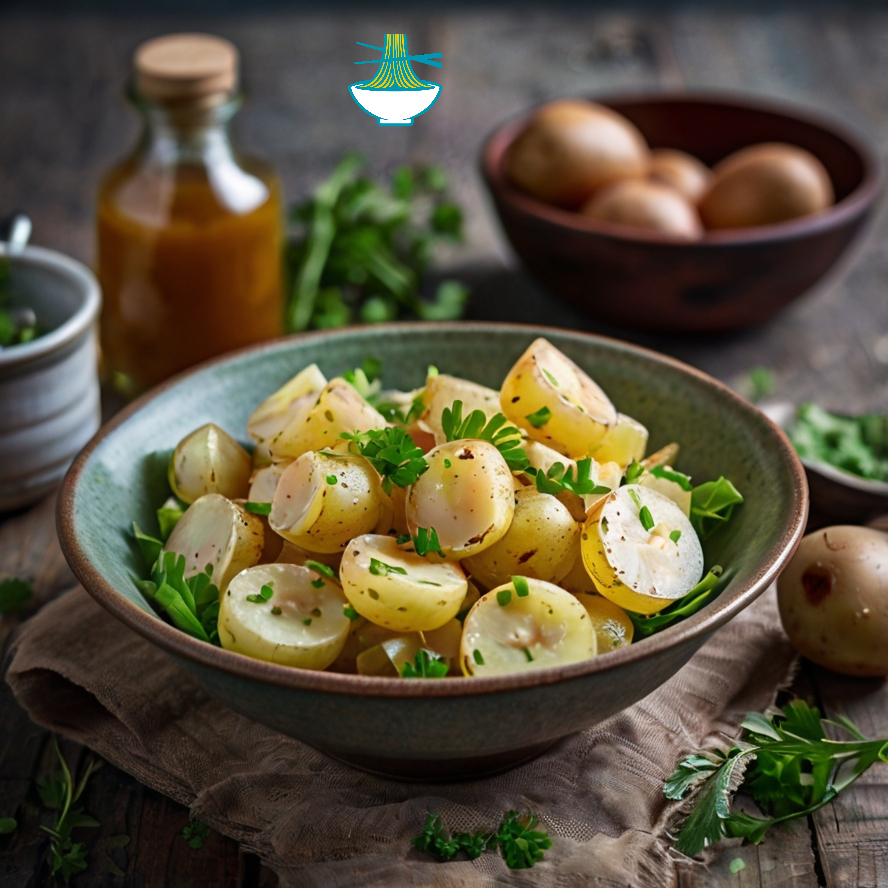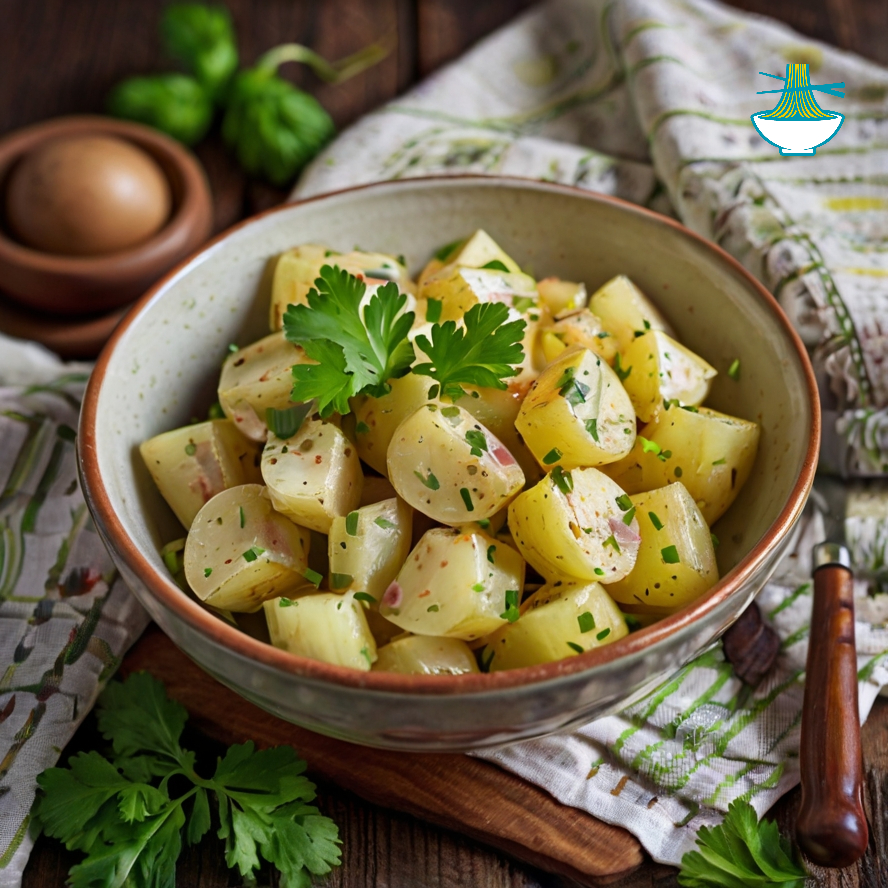Kartoffelsalat is a traditional Germanpotato salad featuring boiled potatoes, onions, and a tangy vinegar-based dressing. Rich in complex carbohydrates, it provides a good source of energy and is high in fiber, which aids digestion. The vinegar-based dressing offers antioxidants, supporting overall health, while onions contribute additional vitamin C. Naturally low in fat and cholesterol-free, this salad serves as a healthy side dish. However, portion control is important, as the salad can become calorie-dense when paired with rich dressings or extra ingredients like bacon. In moderation, Kartoffelsalat is a flavorful and nutritious addition to any meal.
Ingredients:
- 4 medium potatoes, peeled and boiled
- 1 small onion, finely chopped
- 1/4 cup apple cider vinegar
- 1/2 cup vegetable broth (or chicken broth)
- 2 tablespoons mustard (Dijon or yellow)
- 2 tablespoons olive oil
- Salt and pepper to taste
- Fresh parsley for garnish (optional)
Plant-Based Alternatives:
For those following a plant-based or vegan diet, there are simple swaps to make Kartoffelsalat fit your dietary needs:
- Substitute Animal Broth with Vegetable Broth: Replace the chicken broth with vegetable broth to keep the dish completely plant-based. Many vegetable broths are available in both low-sodium and organic options.
- Use White Vinegar Instead of Apple Cider Vinegar: If you prefer a more neutral flavor, you can substitute apple cider vinegar with white vinegar. While both offer similar health benefits, such as aiding digestion, the taste may differ slightly.
Instructions:
1. Boil the Potatoes:
- Start by peeling 4 medium potatoes and cutting them into uniform pieces.
- Place the potatoes in a pot and cover them with water. Bring to a boil and cook for about 15-20 minutes or until they are tender when pierced with a fork.
- Drain the potatoes and let them cool slightly before slicing them into thin rounds or cubes, depending on your preference. Warm potatoes absorb the dressing better, which enhances the flavor.
2. Prepare the Dressing:
- In a separate small bowl, combine 1/4 cup of apple cider vinegar, 1/2 cup of vegetable broth, and 2 tablespoons of mustard (Dijon or yellow mustard works best).
- Whisk together until well combined.
- Slowly add 2 tablespoons of olive oil while whisking to emulsify the dressing.
- Season with salt and pepper to taste. The dressing should be tangy with a hint of mustard flavor, balancing the richness of the potatoes.
3. Combine Potatoes and Dressing:
- While the potatoes are still warm, pour the dressing over them. Toss gently to coat the potatoes evenly with the dressing. Be careful not to break the potato slices, as you want them to remain intact for the best presentation.
4. Add Onions and Marinate:
- Add 1 small onion, finely chopped, to the potato mixture. The onions will absorb the flavors of the dressing, adding a slight sharpness to complement the potatoes.
- Let the salad sit for about 30 minutes to allow the flavors to marinate. This resting time is crucial for achieving a balanced taste and ensures that the salad absorbs the full depth of the vinegar-based dressing.
5. Garnish and Serve:
- Before serving, garnish the salad with freshly chopped parsley for a touch of color and extra freshness.
- Kartoffelsalat can be served slightly warm or chilled, depending on your preference. It pairs perfectly with grilled meats, sausages, or even as a standalone dish for a lighter meal.
Tips for Customizing Your Kartoffelsalat:
- Vegan Option: For a plant-based version, use vegetable broth instead of chicken broth and ensure your mustard doesn’t contain any dairy or other animal products.
- Boost Flavor: Try adding a bit of pickled cucumber or pickled onions to add extra tang and crunch.
- Make it Lighter: If you're looking to reduce calories, swap out olive oil for a lighter oil like avocado oil, or cut down on the quantity of oil used in the dressing.
Tips for Reducing Calories and Making Healthier Choices:
If you're looking to make your Kartoffelsalat a lighter dish, here are some tips to reduce the calorie count and improve its nutritional profile:
- Use Low-Sodium Vegetable Broth: You can substitute the regular vegetable broth with a low-sodium version to help reduce the sodium content of the dish. This is particularly important if you're watching your salt intake for health reasons, such as managing blood pressure.
- Reduce the Amount of Olive Oil: Olive oil is a healthy fat, but it is calorie-dense. You can reduce the amount used in the dressing or substitute it with a lighter oil, such as avocado oil, to maintain the flavor while cutting down on calories.
- Avoid High-Fat Additions: If you typically add ingredients like bacon or fatty meats to the salad, consider leaving them out or opting for leaner protein sources. Bacon, while flavorful, significantly increases the calorie and fat content of the dish.
Storing and Preparing in Advance:
Kartoffelsalat is easy to prepare ahead of time, which is great if you're planning a meal or gathering. Here are some tips for storing and making the dish in advance:
- Storage: You can store the salad in the refrigerator for up to 2-3 days. However, to maintain the best flavor, it’s ideal to eat it on the same day it is prepared. To keep it fresh, store it in an airtight container.
- Make Ahead: To save time, you can boil the potatoes and prepare the dressing a day in advance. Keep the potatoes and dressing separate and combine them just before serving to avoid the salad becoming soggy.
Flavor Variations:
There are many ways to boost the flavor profile of Kartoffelsalat. Here are a few ideas to add variety:
- Fresh Herbs: Fresh parsley is a classic garnish, but you can also experiment with fresh dill, chives, or basil to bring new flavors to the salad.
- Pickled Vegetables: Adding pickled onions, cucumbers, or even pickled beets can provide a tangy contrast that enhances the overall taste of the salad.
- Grated Cheese: For a creamy, savory twist, consider adding grated cheese like Gouda or Parmesan. This will add richness and depth to the dish, though it will also increase the fat and calorie content.
Frequently Asked Questions (FAQ):
Can this dish be served as a main meal?
Kartoffelsalat is typically served as a side dish, but it can certainly be turned into a main meal by adding protein-rich ingredients. Consider topping it with hard-boiled eggs, grilled chicken breast, or a serving of beans for a more filling meal.
What are the health benefits of apple cider vinegar in this dish?
Apple cider vinegar is known for its digestive benefits, helping to balance stomach acidity and promoting healthy digestion. It also contains antioxidants, which help support the immune system. Some studies suggest that apple cider vinegar may even help regulate blood sugar levels.
Can I modify this dish to be gluten-free?
Yes, Kartoffelsalat is naturally gluten-free, as it doesn't contain any wheat-based ingredients. However, if you are adding any other ingredients, such as dressings or processed items, make sure they are labeled gluten-free to avoid cross-contamination.
How can I add protein to this dish?
To make this dish a more balanced meal, consider adding protein-rich ingredients. Some great options include cooked beans, lentils, grilled chicken breast, or even smoked tofu. This will turn your Kartoffelsalat into a hearty and nutritious main course.
Nutritional values and benefits:
4 Medium Potatoes (about 400g, peeled and boiled)
- Calories: 340
- Carbohydrates: 80g
- Protein: 8g
- Fat: 0.4g
- Sodium: 20mg
- Cholesterol: 0mg
- Vitamins:
- Vitamin C: 45mg (75% DV)
- Vitamin B6: 0.4mg (20% DV)
- Minerals:
- Potassium: 1,000mg (28% DV)
- Benefit: Potatoes are an excellent source of complex carbohydrates, providing energy. They are rich in potassium, which helps maintain healthy blood pressure levels. The vitamin C content supports the immune system, and vitamin B6 plays a role in brain health and metabolism.
1 Small Onion (about 70g, finely chopped)
- Calories: 30
- Carbohydrates: 7g
- Protein: 1g
- Fat: 0g
- Sodium: 2mg
- Cholesterol: 0mg
- Vitamins:
- Vitamin C: 5.7mg (10% DV)
- Minerals:
- Calcium: 20mg (2% DV)
- Potassium: 150mg (4% DV)
- Benefit: Onions contain antioxidants, particularly quercetin, which can reduce inflammation. They are also a good source of vitamin C, which boosts the immune system, and potassium, which helps regulate fluid balance and blood pressure.
1/4 Cup Apple Cider Vinegar (60ml)
- Calories: 3
- Carbohydrates: 1g
- Protein: 0g
- Fat: 0g
- Sodium: 1mg
- Cholesterol: 0mg
- Vitamins:
- Vitamin C: 0.4mg (1% DV)
- Minerals:
- Potassium: 11mg (0% DV)
- Benefit: Apple cider vinegar is known for its digestive benefits. It helps balance stomach acid, aids in digestion, and may support blood sugar control. It also contains antioxidants that promote overall health.
1/2 Cup Vegetable Broth (120ml)
- Calories: 10
- Carbohydrates: 2g
- Protein: 0g
- Fat: 0g
- Sodium: 500mg
- Cholesterol: 0mg
- Vitamins:
- Vitamin C: 1.5mg (3% DV)
- Minerals:
- Potassium: 100mg (3% DV)
- Benefit: Vegetable broth adds flavor without many calories. It is low in fat and rich in minerals like potassium, which supports muscle function and fluid balance. It also provides some vitamin C to boost the immune system.
2 Tablespoons Mustard (Dijon or yellow)
- Calories: 10
- Carbohydrates: 1g
- Protein: 0.5g
- Fat: 0.5g
- Sodium: 160mg
- Cholesterol: 0mg
- Vitamins:
- Vitamin C: 0.1mg (0% DV)
- Minerals:
- Calcium: 4mg (0% DV)
- Benefit: Mustard adds flavor with very few calories. It contains small amounts of antioxidants and minerals, including calcium and magnesium, which support bone health and muscle function. The vinegar content may also aid in digestion.
2 Tablespoons Olive Oil (30ml)
- Calories: 240
- Carbohydrates: 0g
- Protein: 0g
- Fat: 27g
- Sodium: 0mg
- Cholesterol: 0mg
- Vitamins:
- Vitamin E: 3.8mg (19% DV)
- Minerals:
- Calcium: 4mg (0% DV)
- Benefit: Olive oil is a source of healthy monounsaturated fats, which help lower LDL (bad) cholesterol and support heart health. It also contains vitamin E, a powerful antioxidant that protects cells from damage and supports skin health.
Salt and Pepper (to taste)
- Calories: Minimal
- Carbohydrates: 0g
- Protein: 0g
- Fat: 0g
- Sodium: Dependent on quantity used
- Cholesterol: 0mg
- Vitamins:
- No significant vitamins
- Minerals:
- Sodium: Dependent on quantity used
- Benefit: Salt is important for fluid balance, nerve function, and muscle contraction. However, excessive salt intake should be avoided as it can contribute to high blood pressure. Pepper may have antioxidant properties and can aid in digestion.
Fresh Parsley (for garnish, optional)
- Calories: 1
- Carbohydrates: 0.2g
- Protein: 0.1g
- Fat: 0g
- Sodium: 1mg
- Cholesterol: 0mg
- Vitamins:
- Vitamin A: 1,000 IU (20% DV)
- Vitamin C: 4mg (7% DV)
- Minerals:
- Calcium: 20mg (2% DV)
- Benefit: Parsley is high in vitamin A, which supports vision and skin health. It also contains vitamin C, which boosts the immune system and helps the body absorb iron more effectively.
Summary of Nutritional Benefits:
Kartoffelsalat provides a combination of vitamins and minerals that support heart health, digestion, and immune function. Potatoes are an excellent source of carbohydrates and potassium, while onions and mustard offer antioxidants. Olive oil provides heart-healthy fats, and apple cider vinegar aids digestion. This dish is a flavorful and nutritious option for any meal.


Comments